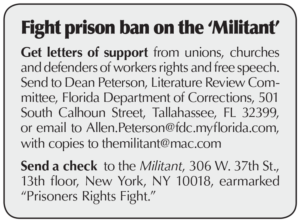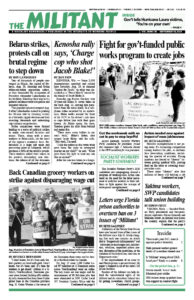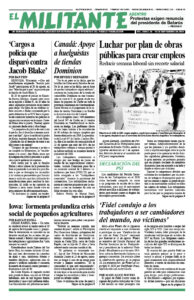Authorities at the Florida State Prison have now banned three of four issues of the Militant since July 31, falsely charging that each one contains an article that is “dangerously inflammatory” and “advocates or encourages riot, insurrection, rebellion, organized prison protest, disruption of the institution, or the violation of the federal law, state law, or Department rules.”
If the impoundment of an issue by one Florida prison is not overturned, the paper is banned in all of the state’s 143 prison facilities.
Readers of the Militant can help defend the constitutional rights of the Militant and its subscribers behind bars by getting co-workers, church groups, union officials and locals, and other organizations to send letters to the prison system’s Literature Review Committee, calling for it to lift the bans.
The first issue banned was no. 30, for the article “Prisoners Demand Release from Overcrowded Jails” by Jeff Powers, which describes the protests aimed at alleviating prison conditions in California amid the COVID-19 pandemic.
Issue no. 33 was banned for the article “After Pennsylvania Prison Ban Is Revoked, Florida Prison Bars ‘Militant,’” which reports on the ban on issue no. 30.
“The Militant has a right to publish factual information, and Florida prisoners have a right to access it,” James Tager wrote the Literature Review Committee from PEN America, the U.S. branch of the international literary and human rights organization. The charge prison officials used to impound issue no. 30 “is unfounded and infringes upon the Militant and its readers’ First Amendment rights.”
The Militant’s lawyer, David Goldstein, has formally appealed the ban on no. 30 and is preparing appeals for issues 31 and 33.
Issue no. 31 was barred for an article “Workers Oppose Federal Cops, Antifa Violence in Portland.”
It argues that “working people don’t like the vandalizing of government buildings, looting and other violent acts, whether justified as political protest or the action of gangs. These aren’t acts of frustration, but conscious destruction, which give the government pretexts to unleash more cop brutality.
“Workers also don’t like the introduction of federal cops, especially ones trained for military combat, which take advantage of the violence to chip away at the right to protest.”
How can Florida prison officials claim that an article that denounces violent acts by both the government and antifa is “dangerously inflammatory?” The Florida officials don’t say.
The Militant has challenged the bans on over 40 issues of the paper in Florida prisons over the last seven years, and succeeded in overturning the big majority. But despite repeated requests, the Literature Review Committee has never explained the basis for upholding a ban or what criteria they use for overturning them.
One prisoner subscriber who wrote in to make sure the Militant knew about the ban said, “This institution has a notorious track record of rejecting any publication that opposes their conservative views and beliefs.”
‘Human and constitutional rights’
A number of California supporters of prisoners’ rights have written to the Literature Review Committee. “Prisoners have both a human and a constitutional right to think, study and read about things that matter — even if the things in question are ‘sensitive’ or controversial,” wrote Carl Jech, a humanities professor in Cupertino, California.

“Powers is simply reporting the news as it happened,” wrote Charlie Hinton, a writer and performer from San Francisco. The argument that the paper is dangerously inflammatory “is bogus.”
The ACLU Foundation Florida, Amnesty International USA, Florida Press Association and Reporters Committee on Freedom of the Press are among the groups that have written to the Literature Review Committee calling for lifting of the ban on the socialist newsweekly.
“The number of letters we have received is a good start,” Militant editor John Studer said. “We need more. That’s one way to let Florida prison officials know their denial of the rights of both prisoners and of the press are drawing increasing notice and opposition.”
“Prisoners have the right to know what is going on in the world, to consider all sides to debates about the way forward for working people, to form their own opinions,” Studer said. “They also have the First Amendment right to petition the government for redress of grievances, including on conditions in the prisons. The Militant like other papers across the country has the right to report on this when they do so. Florida prison officials should lift the bans on the Militant.”

